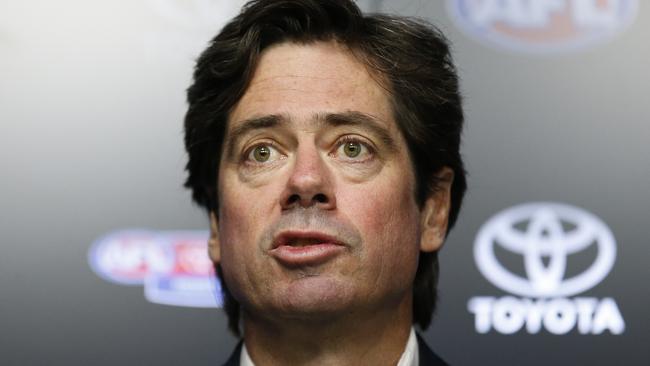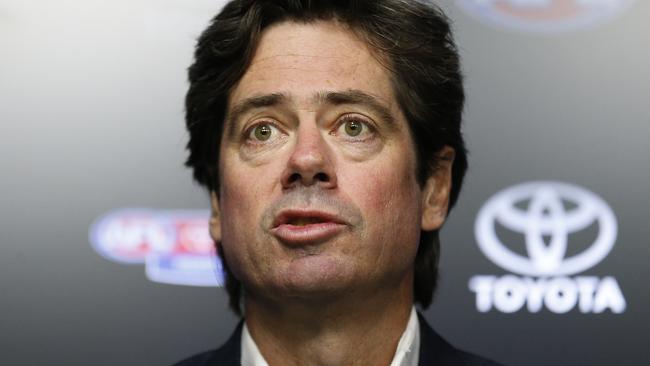Players unfairly targeted after AFL delivered its radical restart proposal, writes Mark Robinson
The AFL stunned many players when it told them they might have to live for 20 weeks in what one club official called a ‘low-level prison’. But did it have to deliver the worst-case scenario?

Mark Robinson
Don't miss out on the headlines from Mark Robinson. Followed categories will be added to My News.
At the start, Eddie McGuire said a nuclear bomb had been dropped on the AFL.
On Tuesday, the AFL dropped a nuclear bomb on its players.
Naturally, there was push-back on the proposal to quarantine players, without families, for a possible 20 of 21 weeks.
It might be necessary to house players, coaches, staff and umpires in a “low-level prison” — as one club official described it — but it's debatable if it was necessary for the AFL to reveal its worst-case scenario.
Why didn't the AFL deliver its best-case scenario?
Or at least deliver the players a plan for the first eight weeks and then say it would reassess after that, depending on the evolving situation Australia finds itself in, particularly on state border restrictions.
In other words, gently take the players with it through this period of uncertainty.
Instead, the AFL created a hive of fear and panic.
The league’s administrators have to make decisions, we get that, but did they really think this one through?
They usually do and maybe they’d argue they were left with little choice other than to drop the bomb.
If they had their time again, would they release such information differently, considering the backlash?
Maybe an empathetic press conference from Gillon McLachlan on Tuesday would’ve soothed the waters.
Evidently, when the news broke on an AFLPA conference call with the majority of the players late Tuesday afternoon, there was an immediate shift in mood — inquisitive to stunned.Mainly from the senior players with children.
Most of the younger lads, without kids, reckon life’s an adventure anyway, so the pushback from them was minimal, if any.
How Tuesday played out also raised eyebrows at club level.
Nathan Buckley indicated he wasn’t aware of the proposal until word filtered out from the AFLPA conference call.
Even some chief executives also weren’t aware of this worst-case scenario.
Relive classic AFL matches from the 60s to today on KAYO SPORTS. New to Kayo? Get your 14-day free trial & start streaming instantly >

There are so many pieces to this pie.
Players have every right to not join the hubs and it’s ridiculous to throw them all under the one umbrella.
One player, who is separated from his partner, has access to his child every two weeks. What a horrible situation for him.
Others have pregnant partners or have very young children. They might have relationship issues. Some might argue their families are more important than football.
And the low-life who broke into Easton Wood’s home and stole, among other items, his premiership medallion didn’t help. These are desperate times and desperados need money and with players away for eight weeks at a time, it means security and health concerns for their partners and children at home can’t be ignored.
Players are being unfairly criticised.
The tennis players have had a crack, which was unedifying.
Even the public has turned on their one-time heroes, calling them selfish and accusing them of living in a bubble.
One former footballer (pre-2000) said the players were soft, arguing they have to “hub up” because it’s their job.
It’s all too nasty.
Buckley views on SEN Radio were interesting.
He has clout and a level head and he effectively said you might as well call the season off if 21-weeks in quarantine was required.
After all, what price do these players have to pay?
But there’s the other side, too.
Richmond was the first team to go public with its code of care, support, connection and responsibility for each other, and Buckley — and other coaches — have adopted a similar attitude.
But does that care and responsibility start and end with their teammates and their families?
Tens of thousands of people rely on football for their livelihoods and any talk of abandoning the season means football would be abandoning them, too.
It’s a hell of a burden to put on the players.
But that’s exactly what the AFL is asking them to do, to not only consider the associated jobs, but to help the AFL save the game.
No, the season can’t be called off. It won’t be called off.
The prevailing view is more than 95 per cent of the players will do what the AFL asks of them. The other 5 per cent might not and still get paid 30 per cent of their wage.
MORE AFL NEWS:
Gary Buckenara column: How to fix ‘broken’ VFL to create real junior talent pathway
Inside story behind Jim Stynes’ Brownlow Medal winning season of 1991
Gary Ablett headlines KFC SuperCoach’s inaugural hall of fame
Forgotten favourites: Can you remember these obscure Essendon players?
While this initial plan seems radical, if not draconian, AFLPA boss Paul Marsh was calm in his response to the 20-week hub proposal.
It’s a discussion point, he said, and anyway the likelihood of 20 weeks in isolation for the players is extremely unlikely.
So, did we really need Tuesday's nuclear bomb?
